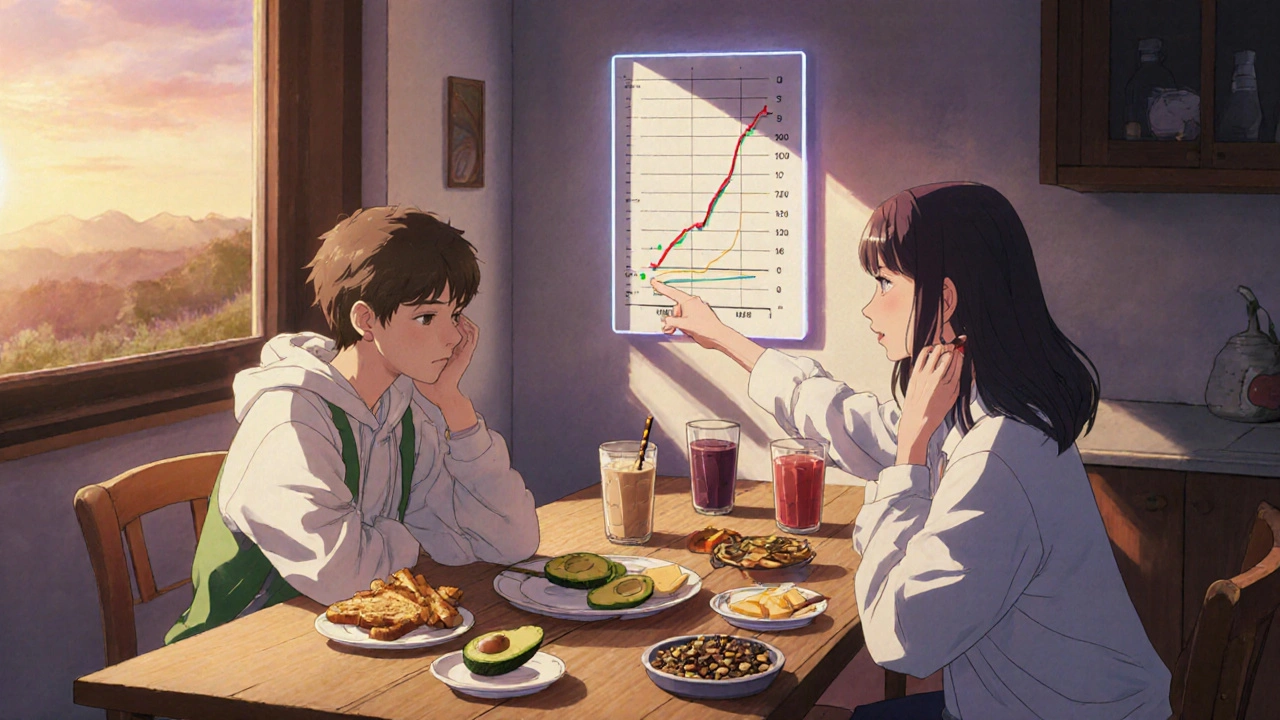ADHD Medication Growth Impact Calculator
How ADHD Medications Affect Growth
This tool estimates potential growth impact based on current research. Remember: growth effects are usually temporary, but monitoring is crucial.
Your Teen's Information
Results
Enter your teen's information to see potential growth impact
When a teenager starts taking ADHD medication, parents often notice changes before the doctor does. The child might not eat lunch at school. They seem thinner. Their clothes don’t fit like they used to. These aren’t just quirks-they’re warning signs that need attention. ADHD medications like methylphenidate (Ritalin, Concerta) and amphetamines (Adderall, Vyvanse) work by boosting dopamine and norepinephrine in the brain. That helps with focus, impulse control, and school performance. But they also affect the body in ways that can’t be ignored-especially when it comes to growth and appetite.
Why Appetite Drops So Fast
Appetite suppression is the most common side effect of stimulant ADHD meds. Studies show between 50% and 80% of teens experience it. It’s not about being picky or rebellious. The medication literally turns off hunger signals in the brain. For many, it hits hardest between 9 a.m. and 3 p.m.-right when school lunch happens. One mom on Reddit shared that her 14-year-old eats one granola bar during the day and then eats 2,000 calories after 5 p.m. when the meds wear off. That’s not a healthy pattern. It leads to nutrient gaps, low energy, and even weight loss.By the time dinner rolls around, the teen is exhausted, overwhelmed, or just not hungry anymore. Even if they eat, they’re not getting the protein, healthy fats, or complex carbs their growing body needs. A 2022 CHADD survey found 19% of parents reported their child lost more than 10% of their body weight on stimulant meds. That’s serious. Growth slows when calories and nutrients are consistently low. And for teens who were already on the lower end of the growth chart, it can push them into a dangerous zone.
How Much Does It Affect Height?
Growth suppression is real-but it’s often misunderstood. Long-term studies, including the MTA follow-up from 2004 and a 2014 study in the Journal of Child and Adolescent Psychopharmacology, show teens on stimulants for several years may end up 1.39 to 2.55 centimeters (about half an inch to an inch) shorter than they would have been without medication. That sounds alarming, but context matters. Most of that delay happens in the first year or two. After that, growth slows but doesn’t stop.And here’s the hopeful part: most kids catch up. A 2023 follow-up to the MTA study found that 89% of teens who experienced growth delays reached their full genetic height potential by age 25. The remaining 11% had a persistent reduction of more than 1.5 cm. That’s not nothing-but it’s also not the end of the world. For many families, the trade-off is worth it: better grades, fewer arguments, less risk of substance abuse, and improved self-esteem.
Not all meds affect growth the same way. Amphetamines (like Vyvanse and Adderall) tend to suppress growth slightly more than methylphenidate-based drugs (like Concerta and Ritalin). A 2019 meta-analysis in CNS Drugs showed a 1.7 cm height reduction over three years with amphetamines versus 1.1 cm with methylphenidate. Extended-release versions cause less daily fluctuation, but they don’t eliminate the effect. And non-stimulants like atomoxetine (Strattera) show almost no growth impact-but they’re also 30-40% less effective at controlling core ADHD symptoms, according to the 2017 Cochrane Review.
Monitoring Growth: What Doctors Should Do
The American Academy of Pediatrics says this clearly: track height and weight every three months during the first year of treatment, then every six months after that. That’s not optional. It’s standard care. If a teen’s growth velocity drops below the 25th percentile for their age, or if their height or weight z-score falls by more than 0.5 or 1.0 respectively within six months, it’s time to act.Most pediatric offices now use electronic growth charts that flag changes automatically. But even with tech, parents need to speak up. If your teen’s pants are getting too long but they’re not gaining weight, mention it. If they’re skipping meals, say so. Don’t wait for the next appointment. Growth isn’t something you can fix later.
Some doctors suggest “medication holidays”-taking a break from meds during summer or school breaks. A 2020 study in the Journal of Attention Disorders found 73% of pediatric psychiatrists support this approach. And research from 2013 shows 87% of teens who paused meds for a few months regained 75% of their normal growth speed. It’s not a cure-all, but it helps. For some families, it’s the only way to keep growth on track without stopping treatment entirely.

What Families Can Do Right Now
You don’t have to wait for the doctor to fix this. There are practical steps you can take today:- Feed before the med kicks in. Serve a high-calorie, protein-rich breakfast before school-eggs, peanut butter on whole grain, cheese, yogurt with nuts. If the first dose is at 7 a.m., eat by 6:30 a.m.
- Load up on nutrient-dense snacks. Keep avocados, trail mix, whole milk, cheese sticks, and smoothies on hand. These are calorie-rich without needing big portions.
- Make dinner a priority. Even if they’re not hungry, encourage them to sit down for a full meal. Add olive oil, butter, or cream to meals to boost calories without volume.
- Track calories for a week. Use a free app like MyFitnessPal to see if they’re getting 1,800-2,500 calories a day. Teens need energy to grow. If they’re consistently under 1,500, it’s a red flag.
- Don’t force food-but don’t ignore hunger cues. If they’re eating well at night, that’s better than nothing. But if they’re only eating junk food after school, you need to intervene.
In extreme cases, doctors may prescribe cyproheptadine, an appetite stimulant. It’s not first-line, but it’s been used successfully in kids who’ve lost significant weight. One case series in the Journal of Child and Adolescent Psychopharmacology showed teens gained 2-3 pounds in four weeks with this approach.
When to Consider Switching Medications
If your teen has lost more than 10% of their body weight, or if their height percentile dropped more than two zones in a year, it’s time to talk about alternatives. That doesn’t mean quitting meds altogether. It means finding a better fit.Non-stimulants like atomoxetine (Strattera), guanfacine (Intuniv), or clonidine (Kapvay) don’t suppress appetite or growth as much. But they’re slower to work and less effective for hyperactivity. For teens with mostly inattention issues, they can be a good option. A newer extended-release amphetamine called Adhansia XR, approved by the FDA in 2023, showed 18% less weight loss in clinical trials compared to older versions. It’s not a miracle, but it’s progress.
And now, pharmacogenetic testing is starting to help. Companies like Genomind use DNA tests to predict how a teen will metabolize ADHD meds. In their 2022 trial, using genetic data to guide dosing cut growth-related side effects by 40%. It’s not widely covered by insurance yet-but it’s worth asking about if your child is struggling.

The Bigger Picture
It’s easy to focus on the numbers: height, weight, calories. But the real question is this: is your teen happier, safer, and more successful with medication? ADHD isn’t just about fidgeting. Untreated, it’s linked to higher rates of car accidents, substance abuse, school dropout, and depression. The benefits of treatment often outweigh the risks.But that doesn’t mean we ignore the risks. Monitoring isn’t a burden-it’s part of the treatment. Just like you’d check blood pressure for heart meds or liver enzymes for antidepressants, you check growth for ADHD meds. It’s not about fear. It’s about responsibility.
Most teens on stimulants do just fine. They grow. They thrive. They graduate. They go to college. But those who slip through the cracks? They’re the ones no one noticed until it was too late. Don’t let that be your child. Track. Talk. Adjust. And never assume that a quiet child who doesn’t complain is fine.
Do ADHD medications permanently stunt growth?
No, most teens catch up to their expected height by their mid-20s. Studies show 89% of adolescents who experienced growth delays during treatment reach their full genetic height potential. Only about 11% have a persistent reduction of more than 1.5 cm, which is typically less than an inch. The key is early detection and intervention-growth suppression is usually temporary if managed properly.
How often should height and weight be checked on ADHD meds?
The American Academy of Pediatrics recommends checking height and weight every 3 months during the first year of treatment, then every 6 months after that. If growth slows significantly-like dropping below the 25th percentile for age or losing more than 0.5 height z-scores in 6 months-your doctor should consider adjusting the dose, switching meds, or scheduling a medication break.
Can I just stop the medication if my teen is losing weight?
Don’t stop abruptly. Stopping suddenly can cause rebound symptoms, mood swings, or increased impulsivity. Instead, talk to your doctor. They may suggest lowering the dose, switching to a non-stimulant, or using a medication holiday during summer or weekends. These strategies can help with appetite and growth without losing the benefits of treatment.
Are non-stimulant ADHD meds better for growth?
Yes. Non-stimulants like atomoxetine (Strattera), guanfacine (Intuniv), and clonidine (Kapvay) don’t typically affect appetite or growth. But they’re less effective for core ADHD symptoms-about 30-40% less than stimulants, according to the Cochrane Review. They’re a good option for teens with mild symptoms, anxiety, or those who’ve had serious side effects from stimulants.
What foods should I give my teen on ADHD meds to help with appetite loss?
Focus on calorie-dense, nutrient-rich foods that don’t require big portions: peanut butter on banana, cheese cubes, whole milk yogurt with granola, smoothies with protein powder and avocado, trail mix with nuts and dried fruit, eggs with whole grain toast, and hummus with pita. Add olive oil or butter to veggies and pasta. Avoid low-calorie snacks like raw veggies or diet drinks-they fill the stomach without giving energy.
Is it safe to take breaks from ADHD medication?
Yes, under medical supervision. Many families use “medication holidays” during summer, weekends, or school breaks to allow for catch-up growth and improved appetite. Research shows 87% of teens regain 75% of their normal growth rate within six months of stopping meds. This approach works best for teens who don’t need daily symptom control for school or social functioning.
Can genetic testing help avoid growth side effects?
Emerging evidence says yes. Companies like Genomind use genetic testing (CYP2D6 enzyme activity) to predict how a teen will metabolize stimulants. In a 2022 trial, using this data to guide dosing reduced growth-related side effects by 40%. It’s not yet standard care or widely covered by insurance, but it’s a promising tool for families struggling with side effects.
What’s the latest research on ADHD meds and growth?
The 2023 MTA follow-up study confirmed that 89% of teens catch up to their genetic height potential by age 25. The FDA approved a new extended-release amphetamine, Adhansia XR, in 2023 that caused 18% less weight loss in trials. The National Institute of Mental Health is funding a $4.2 million longitudinal study (GALS) to track growth over time. Meanwhile, the American Academy of Pediatrics is updating its 2019 guidelines in late 2024 to include clearer thresholds for intervention.

krishna raut
October 31, 2025 AT 18:25Appetite suppression is real. My cousin on Vyvanse lost 15 lbs in 3 months. We switched to Ritalin ER - he gained it back in 6 weeks. No magic, just science.
Nate Girard
November 2, 2025 AT 17:00I’ve been tracking my 15-year-old’s meals since he started Adderall. We started doing smoothies with peanut butter, banana, oats, and whole milk before school - he’s eating way more now. No more ‘I’m not hungry’ at lunch. Also, we do a 2-day weekend break - he eats like a bear on Saturday. It works.
shivam mishra
November 4, 2025 AT 15:32Just want to add - non-stimulants aren’t ‘weaker.’ My son was on Strattera for 18 months. He didn’t lose weight, slept better, and his grades improved. Took longer to kick in, but no more midnight binges. Also, his anxiety dropped. If your kid’s stressed or has GI issues, try it before doubling the stimulant dose.
Prakash pawar
November 5, 2025 AT 18:50Look man we’re all just trying to survive capitalism and ADHD meds are just another tool in the toolbox like caffeine and hustle culture but if your kid is losing weight you’re doing something wrong not the medicine the system the school system the pressure the expectations the whole damn thing
MOLLY SURNO
November 6, 2025 AT 00:17This is one of the most thorough and compassionate summaries I’ve read on ADHD medication side effects. The emphasis on growth monitoring as standard care - not optional - should be mandatory in every pediatric protocol. Thank you for writing this.
Erin Corcoran
November 7, 2025 AT 00:13OMG YES to the smoothies!! 🙌 We started adding flaxseed + protein powder + avocado to every one. My daughter went from 1 snack/day to 3+ and gained 4 lbs in 2 months. Also, the 2-week med holiday in summer? GAME CHANGER. She’s back to her old self - literally hugs me again. 😭
Arrieta Larsen
November 7, 2025 AT 15:44My son’s height z-score dropped 0.8 in 5 months. We cut his dose by 20% and added a bedtime protein shake. He gained 0.3 z-scores in 3 months. No drama. Just consistency.
Mike Gordon
November 7, 2025 AT 16:10Guys. I’m not a doctor. But I’ve seen three kids on these meds. The ones who thrive? Parents who track weight like it’s a stock chart. The ones who struggle? Parents who say ‘they’ll grow out of it.’ Don’t be that parent. Track. Talk. Adjust. Repeat.
Kathy Pilkinton
November 8, 2025 AT 00:34So let me get this straight - we’re supposed to be grateful that a drug that makes kids starve themselves is ‘worth it’ because they might not drop out of school? That’s not a trade-off. That’s exploitation wrapped in a white coat.
Holly Dorger
November 8, 2025 AT 01:15i think we need to talk about how schools dont provide snacks or lunch time flexibility for kids on meds like its their fault they’re not hungry at 11am when the meds are peaking. why dont we just make school start later and give them a snack break? its not the kid its the system
Amanda Nicolson
November 9, 2025 AT 12:46I remember the day my daughter looked at me and said, ‘Mom, I’m so tired all the time. I don’t feel like I’m me anymore.’ That’s when I knew the meds were winning. We went off for 3 months. She cried at first. Then she started laughing again. Then she started eating like she was trying to catch up to the moon. Now she’s back on a lower dose with Strattera. She’s 17. She’s 5’8”. She’s thriving. And she’s happy. That’s the real metric, isn’t it? Not the percentile chart. Not the weight. The joy.
Jackson Olsen
November 9, 2025 AT 22:49My kid’s on Vyvanse. We do the 3-day weekend off. He eats like a wolf on Saturday. We load up on cheese, nuts, eggs, and milk. He’s 14, 5’7”, 110 lbs - still growing. I track every month. It’s not hard. Just write it down. Seriously.
Carolyn Kiger
November 10, 2025 AT 13:48My daughter’s on Concerta. We started giving her a mini-meal at 2 p.m. - a peanut butter and jelly wrap with a glass of whole milk. She eats it in the car on the way home. No pressure. Just food. Now she’s not ravenous by 6 p.m. and we’re not fighting over dinner. Small changes, big difference.
Scott Dill
November 11, 2025 AT 07:27Just had my kid’s 6-month checkup. Growth chart showed a 0.6 z-score drop. Doc said ‘let’s hold off on the next dose increase.’ We cut the dose by 10%. Two months later, he’s back on track. No panic. Just smart adjustments. ADHD meds aren’t one-size-fits-all. And that’s okay.